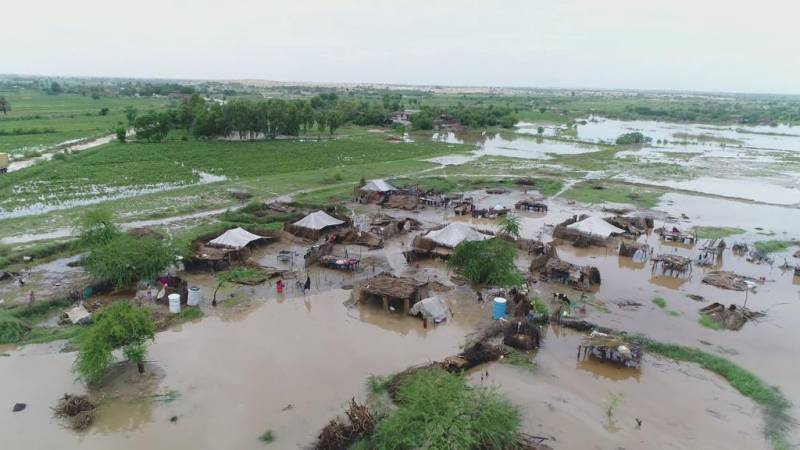By Elsa Zainab Arshad Rashdi (Writer is a student and women’s activist from Larkana)
In August 2022, Pakistan faced an unprecedented disaster as catastrophic floods wreaked havoc, with Sindh bearing the brunt of the devastation. Countless homes were lost, and over two million people were left without shelter – a crisis of unimaginable proportions, equivalent to the entire population of Slovenia.
Amidst this tragedy, one leader stood tall, unwavering in his commitment to the people of Sindh, Bilawal Bhutto-Zardari, Pakistan’s Foreign Minister and Chairman of the Pakistan Peoples Party, who saw an opportunity in the midst of chaos. He declared, “We have turned this catastrophe into an opportunity,” and took decisive action to rebuild shattered lives.
Breaking away from the shackles of patriarchal norms, the Government of Sindh launched its groundbreaking initiative – “Sindh Peoples Housing For Flood Affectees” (SPHF) – aimed at empowering women through land ownership in Larkano, Sindh province earlier this year. This visionary move, the brainchild of Bilawal Bhutto-Zardari, seeks to rebuild houses and grant land titles to 2.5 million flood affectees.
On Friday Bilawal Bhutto Zardari granted the first 5,000 women land titles in the first phase, endowing them with a sense of ownership and control over their destinies. It echoes the historic land reforms of Shaheed Zulfikar Ali Bhutto, striving to uplift the landless peasants and dismantle the oppressive feudal system. This initiative is a testament to the Bhutto family’s legacy of championing the rights of the oppressed, a legacy now carried forward by Bilawal Bhutto-Zardari.
The inspiration behind this initiative lies in the indomitable spirit of Shaheed Mohtarma Benazir Bhutto (SMBB), an icon of women’s rights and empowerment. As Pakistan’s first female Prime Minister, she dedicated her life to fighting for the marginalized and underprivileged. The Benazir Income Support Programme (BISP), established by President Asif Ali Zardari, stands tall as a tribute to her vision, providing financial aid to women and vulnerable groups, breaking the chains of poverty and deprivation.
Chairman Bilawal Bhutto-Zardari, speaking at the groundbreaking ceremony of SPHF, passionately emphasized the transformative power of financially empowering women. He wholeheartedly embraces his mother’s teachings, as he fervently believes that empowering women uplifts entire households. This initiative signifies a monumental leap toward women’s empowerment, giving them economic independence, social status, and a powerful voice in decision-making.
This move has garnered widespread praise from women’s rights activists and civil society organizations as a significant step forward in the fight for gender equality and social justice. Moreover, it acknowledges the invaluable role women play in the agricultural sector, a cornerstone of our nation’s economy.
However, the path to empowering women through land ownership is not without its challenges. In a country where a privileged few monopolize land ownership, granting women their rightful place requires breaking through cultural norms, legal barriers, and ensuring access to credit and resources.
Amidst political rhetoric, Bilawal Bhutto-Zardari’s actions speak volumes. He goes beyond empty promises and photo ops, standing firmly with the people, sharing their pain, and delivering real solutions. The initiative to provide 2 million houses is not merely an asset transfer; it is a symbol of hope and resilience.
“Apni Zameen Apna Makaan” – this slogan encapsulates the significance of the achievement. This initiative is a beacon of light, dispelling the darkness that floods brought into people’s lives, offering a better tomorrow, and promising safety and security for those who lost so much.
As readers, we must not underestimate the importance of the youth in politics – a force that brings productivity and creativity to the forefront. Bilawal Bhutto-Zardari exemplifies a young leader who doesn’t shy away from taking responsibility, even in the face of adversity. While some leaders indulge in trivial pursuits, Bilawal remains steadfast in his mission to uplift lives and transform society.
As we look ahead to the future of our nation, let us make informed choices when casting our votes. The difference between a true leader like Bilawal Bhutto-Zardari, who acts with genuine compassion and foresight, and those who prioritize superficial distractions will become abundantly clear.
In closing, let us express our heartfelt gratitude to Foreign Minister and Chairman Bilawal Bhutto-Zardari for his unwavering dedication to the flood affectees. His memory of their suffering, his commitment to rebuilding lives, and his efforts toward a brighter future for Pakistan are commendable and deeply appreciated.










